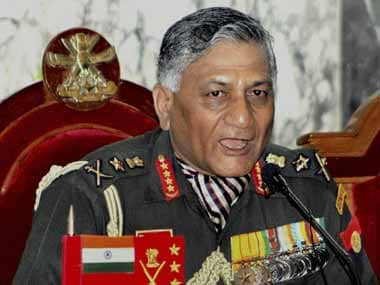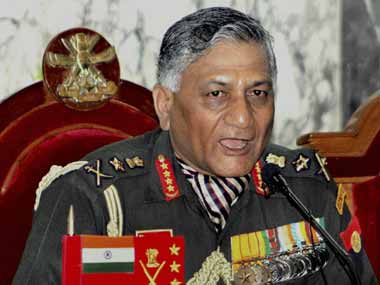By Vivek Katju It seems that the intense media focus of the last few days on the General V K Singh and the Technical Support Division controversy is now abating. However, numerous questions haunt the mind about this sad, sorry situation which has come to pass in our national life. Among them are: Will the nation’s most sensitive institutions be allowed to be gravely damaged to satisfy personal egos and a compelling desire to settle scores? Will the country’s political leadership remain oblivious, or worse, uncaring about the profound damage being inflicted on the very foundations of the state? Will every value be sacrificed at the altar of competitive politics? In the Mahabharata all dramatis personae are responsible, in some measure, for the final denouement, so too in this appalling drama. Many Army Leaders, past and present, seem to have cared neither for their great institution nor for national interest. Senior bureaucrats and advisors who should remain above partisan considerations were seemingly not so. Political leaders who guide the polity to ensure that its institutions cohere also appear to have failed to manage the situation. It requires high quality statecraft to handle such issues involving principles and emotion. This writer vividly recalls an instance of statecraft. Though the matter was not complex, the handling was swift and decisive. At a meeting of the Parliamentary Standing Committee for the Ministry of External Affairs in the late 1990s India’s policy and actions in a country in our neighbourhood were under discussion. Some MPs were pressing the then Foreign Secretary who was briefing the Committee to go into details of what India was doing; they felt that India was not doing enough. [caption id=“attachment_1134557” align=“alignleft” width=“380”] VK Singh in this file photo. PTI[/caption] The Foreign Secretary did not wish to go into sensitive areas. After a few minutes the Committee Chairperson, former Prime Minister I K Gujral, simply said that he knew the actions that were being taken to safeguard Indian interests and that it would not be appropriate to discuss them. That was statecraft for it put a lid on an issue which had necessarily to be kept secret. It is clear from media reports that the present Army Leadership decided to conduct an enquiry into the activities of the Technical Support Division, an undercover unit which was set up relatively recently. The allegation seems to be that this unit engaged in inappropriate activity during General V K Singh’s tenure. If the present Army Leadership felt that this unit was not needed it could have simply shut it down and informed the bureaucratic and political leadership of its decision. It could have indicated to them broadly of the kind of activity the unit had undertaken which had lead to the decision. And all this could have been done discreetly without putting anything down on paper. This course of action would have been in keeping with normal practice. It is obvious that the unit’s actions whatever they may have been did not damage our democratic institutions seriously leave alone permanently. If its activities were inspired by General V K Singh, once he had retired it could have simply not continued to do so. That a prudent course of action was not followed and an enquiry was conducted and a written report submitted seems to indicate that “history” was a factor. If this is so it reflects badly on those who made these decisions. Once the report reached the Defence Ministry’s senior bureaucracy it should have ensured that no such report was officially kept. Swift and decisive steps should have been taken to ensure the complete deniability of the report. Naturally corrective action to rule out any possibility of a repetition of what the government considered unacceptable action of the unit had to be taken. Reports indicate that this has been done. If the MOD thought that this was such a grave matter that it needed to be brought to the attention of the Government’s top political and bureaucratic leadership it should have ensured that it was done discreetly. The bureaucratic and the political leadership should have also ensured discretion and deniability. Is this writer suggesting a cover up? The answer is an emphatic no. The fact is that all governments through authorised institutions undertake secret activity. Such activity is undertaken in a world of shadows. This world, especially in democracies, is not lawless or unaccountable. It is however governed by norms that are effective but outside the public gaze. If individuals or institutions break the norms for personal or ideological reasons action is taken but it has to be done quietly. If this grey world comes out into the open, those who manage it have to accept failure, for national interest suffers. The nature of accountability of intelligence agencies and units is an important matter and requires national attention. Once the media had broken this story it would have been best if General V K Singh had maintained a stoic silence or confined himself to denying the allegations briefly and in general terms. He could have simply said that the work he did as the Army Chief did not give him the luxury of going into details and he would leave it to the Government to respond. He appears to have been inter alia riled by the timing of the story which seemed to target his sharing a public platform with Shri Narendra Modi. “History” again would have roused suspicions in his mind and those of his friends that politics was at work. If that was so he should have considered the possibility of a trap being set to lure him into going into details so that he again became the subject of harmful controversy. If this was so he walked straight into the trap. Such reports do not appear in the media on their own. Normally they are leaked. If someone did so he did great harm to the nation. And now as a citizen I can only hope that no further politics will be played on this sensitive issue and it will be allowed to simply fade away. One final thought. How would the Government have handled this matter if Pranab Mukerjee instead of being the President had been part of the Cabinet? With his expertise in statecraft would he have allowed this sad, sorry situation come to pass or would he have nipped it in the bud? Vivek Katju is a retired diplomat who served as India’s ambassador to Afghanistan.
VK Singh in this file photo. PTI[/caption] The Foreign Secretary did not wish to go into sensitive areas. After a few minutes the Committee Chairperson, former Prime Minister I K Gujral, simply said that he knew the actions that were being taken to safeguard Indian interests and that it would not be appropriate to discuss them. That was statecraft for it put a lid on an issue which had necessarily to be kept secret. It is clear from media reports that the present Army Leadership decided to conduct an enquiry into the activities of the Technical Support Division, an undercover unit which was set up relatively recently. The allegation seems to be that this unit engaged in inappropriate activity during General V K Singh’s tenure. If the present Army Leadership felt that this unit was not needed it could have simply shut it down and informed the bureaucratic and political leadership of its decision. It could have indicated to them broadly of the kind of activity the unit had undertaken which had lead to the decision. And all this could have been done discreetly without putting anything down on paper. This course of action would have been in keeping with normal practice. It is obvious that the unit’s actions whatever they may have been did not damage our democratic institutions seriously leave alone permanently. If its activities were inspired by General V K Singh, once he had retired it could have simply not continued to do so. That a prudent course of action was not followed and an enquiry was conducted and a written report submitted seems to indicate that “history” was a factor. If this is so it reflects badly on those who made these decisions. Once the report reached the Defence Ministry’s senior bureaucracy it should have ensured that no such report was officially kept. Swift and decisive steps should have been taken to ensure the complete deniability of the report. Naturally corrective action to rule out any possibility of a repetition of what the government considered unacceptable action of the unit had to be taken. Reports indicate that this has been done. If the MOD thought that this was such a grave matter that it needed to be brought to the attention of the Government’s top political and bureaucratic leadership it should have ensured that it was done discreetly. The bureaucratic and the political leadership should have also ensured discretion and deniability. Is this writer suggesting a cover up? The answer is an emphatic no. The fact is that all governments through authorised institutions undertake secret activity. Such activity is undertaken in a world of shadows. This world, especially in democracies, is not lawless or unaccountable. It is however governed by norms that are effective but outside the public gaze. If individuals or institutions break the norms for personal or ideological reasons action is taken but it has to be done quietly. If this grey world comes out into the open, those who manage it have to accept failure, for national interest suffers. The nature of accountability of intelligence agencies and units is an important matter and requires national attention. Once the media had broken this story it would have been best if General V K Singh had maintained a stoic silence or confined himself to denying the allegations briefly and in general terms. He could have simply said that the work he did as the Army Chief did not give him the luxury of going into details and he would leave it to the Government to respond. He appears to have been inter alia riled by the timing of the story which seemed to target his sharing a public platform with Shri Narendra Modi. “History” again would have roused suspicions in his mind and those of his friends that politics was at work. If that was so he should have considered the possibility of a trap being set to lure him into going into details so that he again became the subject of harmful controversy. If this was so he walked straight into the trap. Such reports do not appear in the media on their own. Normally they are leaked. If someone did so he did great harm to the nation. And now as a citizen I can only hope that no further politics will be played on this sensitive issue and it will be allowed to simply fade away. One final thought. How would the Government have handled this matter if Pranab Mukerjee instead of being the President had been part of the Cabinet? With his expertise in statecraft would he have allowed this sad, sorry situation come to pass or would he have nipped it in the bud? Vivek Katju is a retired diplomat who served as India’s ambassador to Afghanistan.
VK Singh and UPA: Playing politics, damaging our institutions
FP Archives
• September 26, 2013, 11:12:26 IST
In the Mahabharata all dramatis personae are responsible, in some measure, for the final denouement, so too in this appalling drama.
Advertisement
)